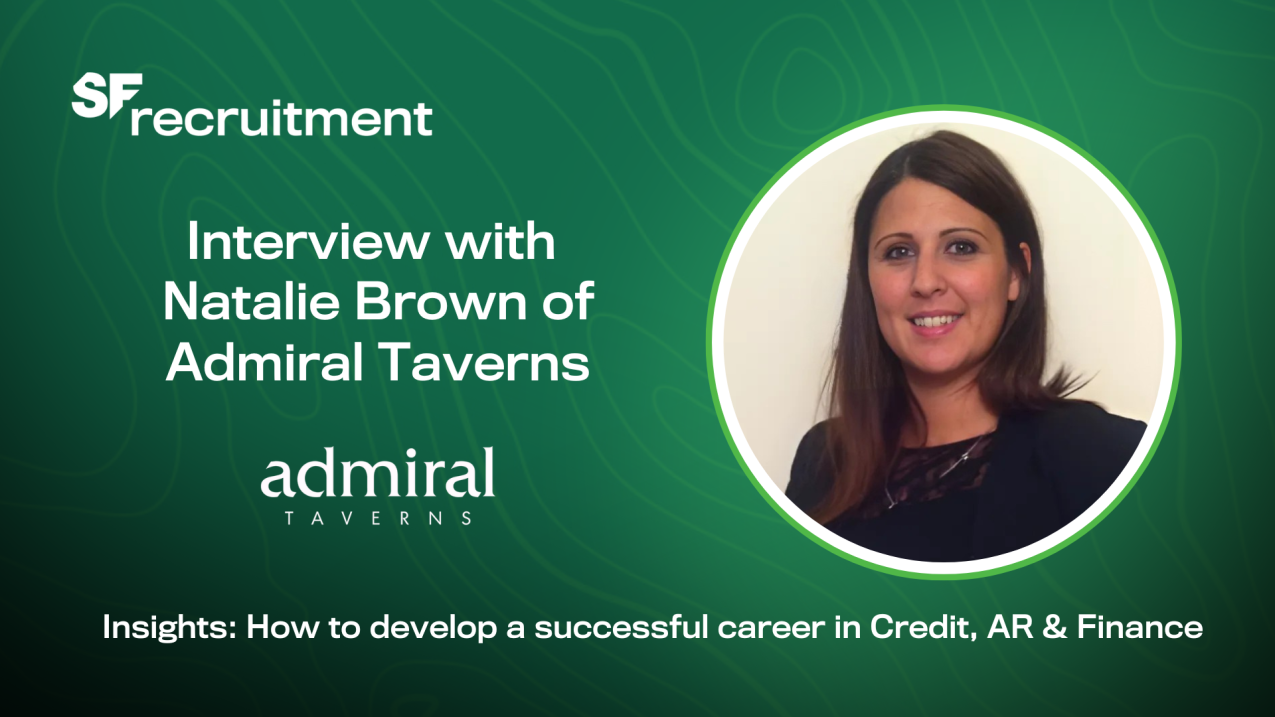
How to develop a successful career in credit, AR and finance. With Natalie Brown of Admiral Taverns

If you've ever wondered 'What Finance Jobs are there?' then this interview with Natalie Brown, – Senior Transactional Services Manager, Admiral Taverns will be of interest to you!
Natalie speaks to SF Recruitment about how to build a successful credit and AR function, what are the current and future challenges facing the sector and how to develop a successful career in credit, AR and finance.
Natalie began her career in credit control in 2010, obtaining her CICM professional in 2015. She joined community pub company, Hawthorn in 2015 as Credit Manager, where she worked for over 7 years until the group was acquired by Admiral Taverns in 2022. Natalie continued progressing to become Senior Transactional Services Manager across Admiral with a wider responsibility for the transactional finance team.
What do you look for from credit professionals when hiring?
- Our business is a mixture of B2B and working with customers who run the group’s pubs – it’s important to have credit experts who can be flexible and adapt to these different conversations. We look for recruits who show resilience, particularly for collection roles, but also people who are capable of building relationships, understanding and pre-empting credit issues, rather than responding to every situation in the same way.
- I am also a great believer in the value of the CICM, we encourage our staff to become professionally qualified through training and accreditation. We often look for the right personality type first and then experience of credit control is secondary, we have had very successful recruits who came to us with little or no prior credit / AR experience.
What advice could you give to Credit Managers who are new to management?
- It’s important to create a motivated and engaged team, now that we are in a hybrid working environment more than ever. I spend a lot of time focussing on reward and recognition, but also little bits of friendly competition among the team. We have incentives relating to cash collection and overdue debt, making sure that they are achievable but also stretching. Alongside CICM training, we also run a lot of internal training, which I deliver or is led by the Credit Manager, focussing on best practice in areas such as telephone etiquette.
What is the key to building a great credit team?
- I think that recognising your own strengths and weaknesses, and then recruiting to compliment them, is really important. Having a dynamic team that work effectively together is vital, both in terms of skillset but also the personality in the team. Above all else, having a strong work ethic across the team is so important, with each individual wanting to go the extra mile to hit key targets.
What advice would you give to credit professionals who want to progress?
- The CICM really benefitted me, not just in credit specific expertise, but also more widely in accounting knowledge and leadership. Other advice I would give is to take a risk, I moved from an established company to a start up in Hawthorn, but it allowed me to get involved in lots of areas that I wouldn’t have otherwise had exposure to.
- Learn the broader accountancy fundamentals, otherwise it can be hard to move into a wider transactional finance role.
- Join a company that offers you opportunity – that might be a smaller, growing business, but if you are in the wrong role where you cannot see your career developing then don’t be afraid to make the move – a lot of companies promise progression that is never realised.
- Build relations with the senior management of your business, this will help you understand the organisation better and when opportunities for greater responsibility are available, you will be visible to them.
- Don’t expect progression without putting the work in – sometimes finance professionals expect to advance before this, whereas if you put in that extra effort, the rewards will come. Throughout my career I have worked a lot of extra hours and with dedication, which ultimately paid off.
What are the biggest challenges that you face currently and in the future?
- Currently, recruitment is the biggest challenge I’m experiencing. Covid has completely changed the way people work, and this doesn’t necessarily help the credit and AR professions. We are entirely supportive of a healthy work/life balance, but there are times when remote working can create barriers to working together as a team. Ultimately our aim is to create a positive working environment that people want to be part of.
- Technology is certainly changing the role of the credit function – it is gradually reducing the administrative burden on the team, automating a number of processes. This allows our team to focus on building a relationship with our licensees, tackling overdue debt and disputes rather than simply order release processes.
Any final advice for credit professionals?
- Don’t underestimate the value of your credit expertise and the CICM qualification. A lot of people believe that ACCA is the quicker way to progress in finance, but credit management can teach you a lot more about people skills, than simply the manipulation of spreadsheets, and you can absolutely still progress to senior levels.
SF would like to say a special thank you to Natalie for her time and thoughts for this special feature.
Related News





